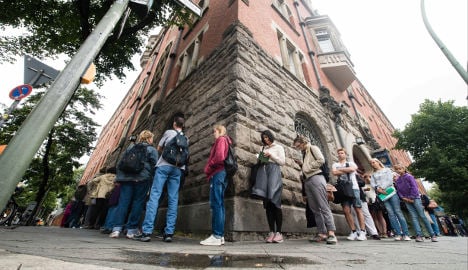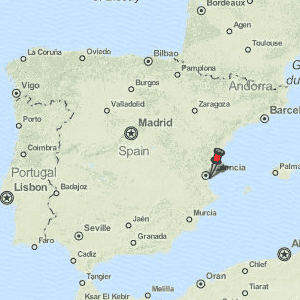Recent arrivals and long-time locals alike know the drill when moving house in Germany: sign up immediately at the Bürgeramt or Bürgerbüro registration office with your new address. If you don't you can't open a bank account or, most importantly for non-EU citizens, apply for a residence permit to stay in the country.
But even the process of just getting in the door to take this first step can prove frustrating and bureaucratic. Many registration offices require an appointment first, but finding one available online is often difficult and the alternative of waiting in line until one opens up can last hours.
You’re supposed to register a new Berlin address within two weeks of moving or face a fine, but when The Local last checked, there were no available appointments online for the next two months.
That’s where the website Bürgeramt Termine hopes to step in.
“We needed an appointment, but there wasn’t one for the next three months. We said ‘there has to be a solution to this’,” co-founder Mateus Kratz told The Local.
Kratz founded Bürgeramt Termine in June, the along with fellow Berlin start-up scenesters Martin Becker and Jörn Kamphuis – who also happens to be the winner of the 2013 Mr. Germany male beauty contest.

From left, co-founders Jörn Kamphuis, Martin Becker and Mateus Kratz. Photo: Bürgeramt Termine.
'People don't have 24 hours to do this'
To find an appointment with Bürgeramt Termine, simply fill out a form with your name, contact information, what area of Berlin you’d like to register in and whether you want to go in the morning or afternoon. You can sign up for three different services: getting an appointment to register your apartment, renewing your passport or getting an identification card.
The site’s algorithm then analyzes Bürgeramts’ calendars over 24 hours, searching for open time slots and cancellations so it can snatch up one that matches your needs.
Kratz explained that the algorithm basically functions as if it were an individual person, constantly refreshing the appointment page until a timeslot opens up. He emphasized that the site does not blanket book appointments and sell them on, but rather starts a search for individual users when they request one.
“This is something you could do yourself, or pay a secretary to do,” he told The Local. “But I know people don’t have 24 hours to do this.”
If you want an appointment within the next five days, you pay €25, while getting an appointment within two days costs €45.

Dozens of people wait in line outside the Berlin Bürgeramt in Neukölln. Photo: DPA.
Around 200 people have registered with the site over the past month, many of whom Kratz said need an appointment to get their passports renewed in a hurry so they can go on vacation.
“We have people writing to us saying they would pay even more because we made it possible for them to go on holiday,” he said.
Some have questioned whether it is fair that only people with enough money can afford to use the service. Kratz said he understood this point, but that they also intend to use the site as a way to get city officials to make changes to the frustrating registration process.
“We personally feel that it is morally fine what we are doing,” he said. “The idea is to get coverage so that things will change.
“What are officials doing if there is no pressure from the public? There is nothing happening. We see the only way to make something happen is to go out and make an alternative that people will talk about.”
And the website certainly has gotten the city to talk – and to try to shut it down.
Blocking site is 'not the right way'
The Berlin Department for Interior and Sport told The Local they were aware of a private website selling appointments for a price and they found it “unacceptable”, but they do not have sufficient ground to bring charges.
Instead, the department said it is taking steps to prevent the website from functioning properly.
“The chances of successful legal action are rather doubtful. Therefore efforts from here are focused on increasing technical measures to prevent the website’s algorithm,” an interior department spokesperson told The Local in an email.
“Appointment bookings occurring at certain intervals from conspicuous registrants will be reviewed and the corresponding bookings deleted. Name changes on appointments will lead to automatic cancellations and must then be booked again. We have also taken additional steps that we will not state publicly.”
The city department also said that it is “working intensively” to speed up processing of appointments.
Despite the city’s efforts to block the site and cause some shut-downs, Kratz said they are working to adapt it and have added an extra step for users to give personal authorization for them to book an appointment.
But as of Friday morning the site said it was temporarily not accepting further bookings.
He added that they have not been directly contacted by the city.
“Trying to get rid of us and block us is not the right way. They should be making things better for people,” he said. “We wouldn’t exist if everything was working fine.”







 Please whitelist us to continue reading.
Please whitelist us to continue reading.
Member comments